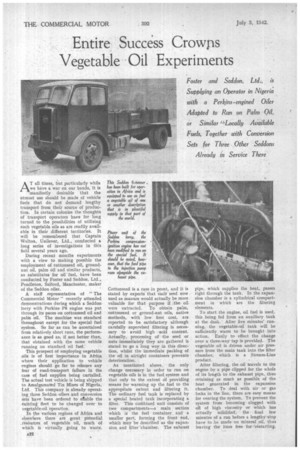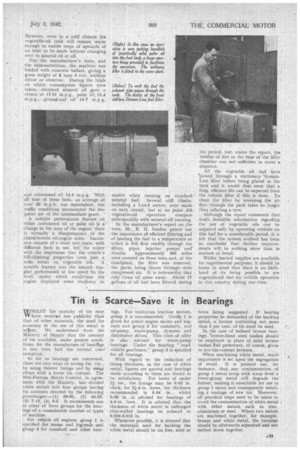Entire Success Crowns Vegetable• Oil Experiments
Page 24

Page 25

If you've noticed an error in this article please click here to report it so we can fix it.
AT all times, but particularly while we have a war on our hands, it is 'manifestly desirable that the utmost use should be made of vehicle fuels that do not demand lengthy transport from their source of production. In certain colonies the thoughts of transport operators have for long turned to the possibilities of utilizing such vegetable oils as are readily available in their different territories. a will be remembered that Captain Walton, Unilever, Ltd., conducted a long series of investigations in this field several years ago.
During recent months experiments with a view to making possible the employment of cottonseed oil, groundnut oil, palm oil and similar products, as substitutes for oil-fuel, have been conducted by Foster and Seddon, Ltd., Pendleton, Salford, Manchester, maker of the Seddon oiler.
A staff representative of "The Commercial Motor" recently attended demonstrations during which a Seddon lorry with Perkins P6 engine was put through its paces on cottonseed oil and palm oil. The machine was standard throughout except for the special fuel system. So far as can be ascertained from relatively short runs, the performance is as good as, if not better than, that obtained with the same vehicle running on standard oil fuel.
This prospect of employing vegetable oils is of first importance in Africa where their application to vehicle engines should go far to remo,ve any fear of road-transport failure in the case of fuel supplies being curtailed. The actual test vehicle is being shipped to Amalgamated Tin Mines of Nigeria, Ltd. This company is already operating three Seddon oilers and conversion sets have been ordered to dable the existing fleet to be changed over to vegetable-oil operation.
In the various regions of Africa and elsewhere there are great pbtential resources, of vegetable oil, much of which is virtually going to waste. Cottonseed is a case in point, and it is stated by experts that such seed now used as manure would actually be more valuable for that purpose if the oil were extracted. To obtain palm, cottonseed or ground-nut oils, native methods, with low first cost, are reported to be satisfactory although carefully supervised filtering is necessary to avoid high acid content. Actually, processing of the seed or nuts immediately they are gathered is stated to go a long way in this direction, whilst the immediate packing of the oil in airtight containers prevents deterioration.
As mentioned above, the only change necessary in order to run on vegetable oils is in the fuel system and that only to the extent of providing means for warming up the fuel to the appropriate extent and filtering it. The ordinary fuel tank is replaced by a special heated tank incorporating a filter. This coffibined unit consists of two compartments--a main section which is the fuel container and a smaller part, forming the front end, which may be described as the expansion and filter 'chamber. The exhaust pipe, which supplies the heat, passes right through the tank. In the expansion chamber is a cylindrical compartment in which are the filtering elements.
To start the engine, oil fuel is used, this being fed from an auxiliary tank at the dash, After five minutes' running, the vegetable-oil tank will be sufficiently warm to be brought into action. Easily to effect the change over a three-way tap is provided. The vegetable oil is driven under air pressure from the main tank into the filter chamber, which is a Stream-Line product.
After filtering, the ail travels to the engine by a pipe clipped for the whole of its length to the exhaust pipe, thus retaining as much as possible of the heat generated in the expansion chamber. To deal with air or gas locks in the line, there are easy means for venting the system. To prevent the systere from becoming clogged with oil of high viscosity or which has actually solidified, the final few minutes of a run before a lengthy stop have to be made on mineral oil, thus leaving the lines free for restartirig. However, even in a cold climate the vegetable-oil tank will remain warm enough to enable stops of upwards of an hour to be made without changing over to mineral oil at all.
For, the manufacturer's tests, and • the demonstrations, the machine was loaded with concrete ballast, giving a gross weight of 8 tons 3 cwt. without • driver or observer. During the trials
on which consumption figures were taken, standard Mineral oil gaVe return of 17.01 m.p.g., palm oil, 15.4 m.p.g., groun,d-nut oil. 14.7 m.p.g.
and cottonseed oil 14.5 m.p.g. -With all four of these fuels, an average of over 20 m.p.h-. was maintained, but traffic conditions necessitated the frequent use of the intermediate gears. '
A notable performance feature on either cottonseed oil or palm oil is a. change in the note of' the engine; there is virtually a disappearance of the characteristic oil-engine noise. Successive circuits of a short test route, with different fuels in use, left the writer with the impression that the vehicle's hill-climbing properties were just a trifle better on vegetable oils. A notable feature was the smooth topgear, performance at low speed tut the level, under which conditions the engine displayed some tendency to snatch when running on standard mineral fuel. • Several stiff climbs, including a 1-in-5 ascent, were made on each circuit, but at no point did.
vegetable-oil operation compare unfavourably with mineral-oil running.
In the manufacturer's report on the tests, Mr.. R. H. Seddon points out the importance of efficient filtering.and of heating the fuel to a temperature at -which it %Tern flow readily through the filters, -pipes, injector pumps' and nozzles. Approximately 300 mileswere covered on these tests and, at the conclusion, the filter was removed, the packs being blown through. with compressed air. It is noteworthy that only 'clean oil came ai,yay. About 17 gallons of oil had been filtered during the period., but, states the report, the residue of dirt in the base of the filler chamber was not sufficient to cover a sixpence. .
All the vegetable oil had been *p'assed through a stationary 'StreamLine filter before being placed in the . tank and it would thus seem that a long, efficient life can be expected from the Vehicle filter if this is done. To clean the filter by reversing the air flow through the pack takes no longer than inflating a tyre.
, Although the report comments that much, desirable information regarding the use of vegetable oils can be acquired only by operating vehicles on this fuel for a considerable period, it is felt that the system evolved has been so successful that .further improvements will be nothing more than in matters of detail.'
Whilst limited supplies are available for experimental purposes, it should be borne in mind that there is no likelihood of its being possible to use vegetable-oil fuel for vehicle operation in this country during war-time.




















































